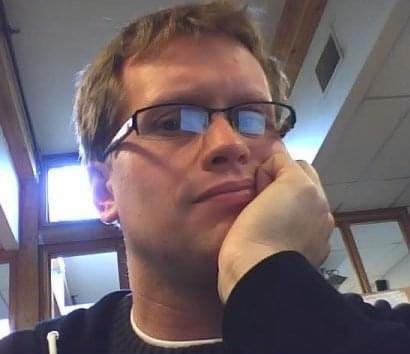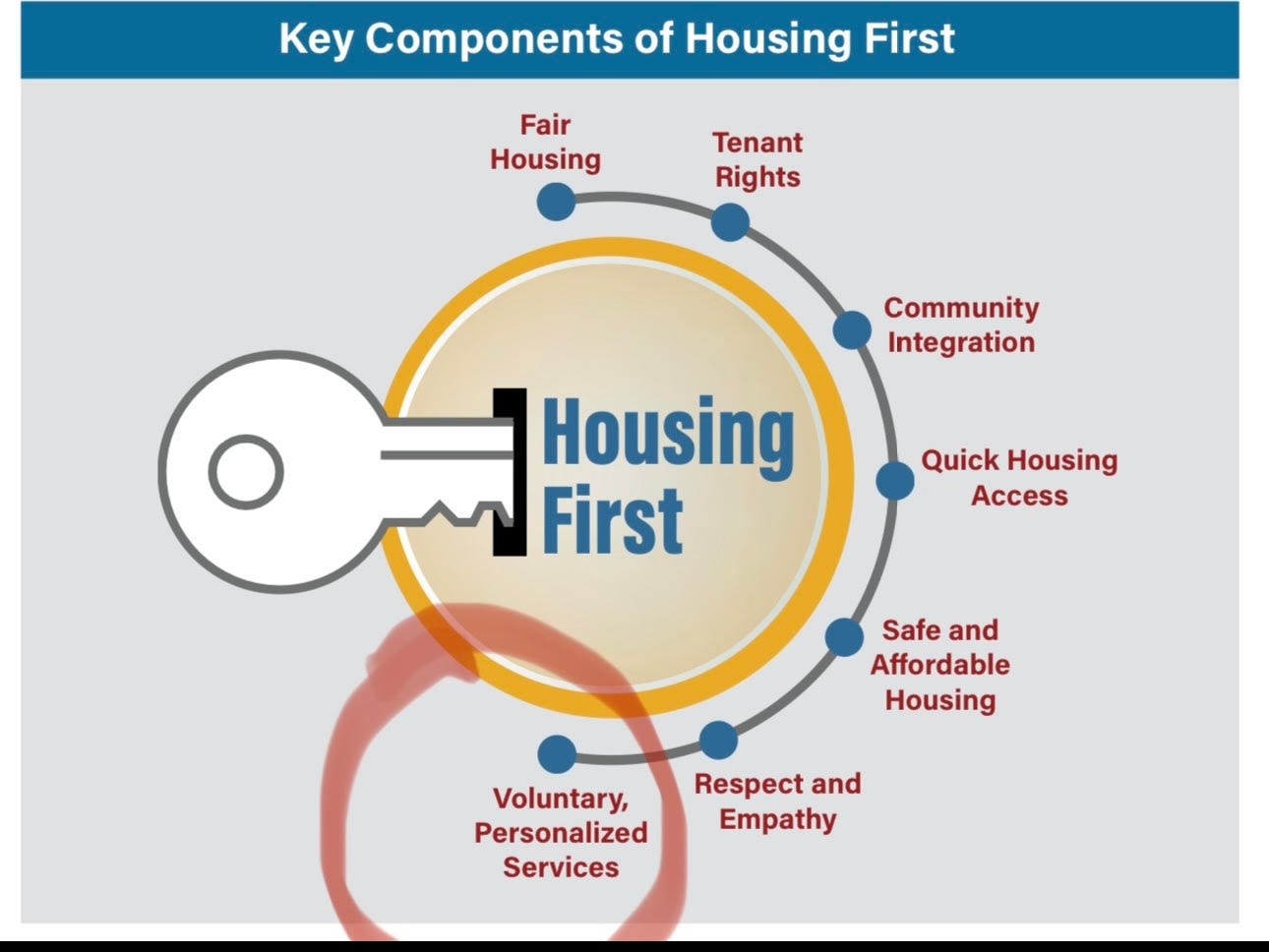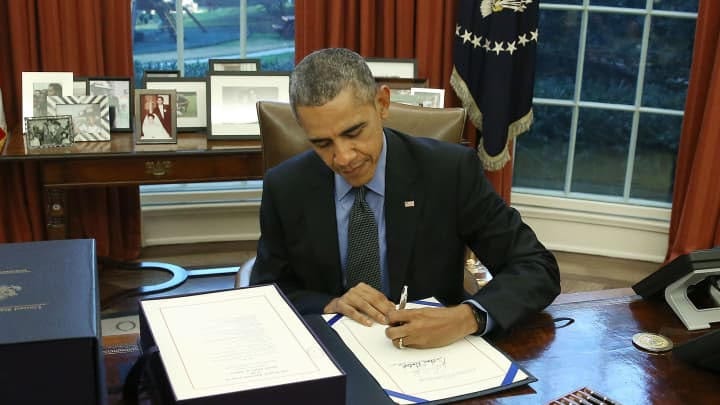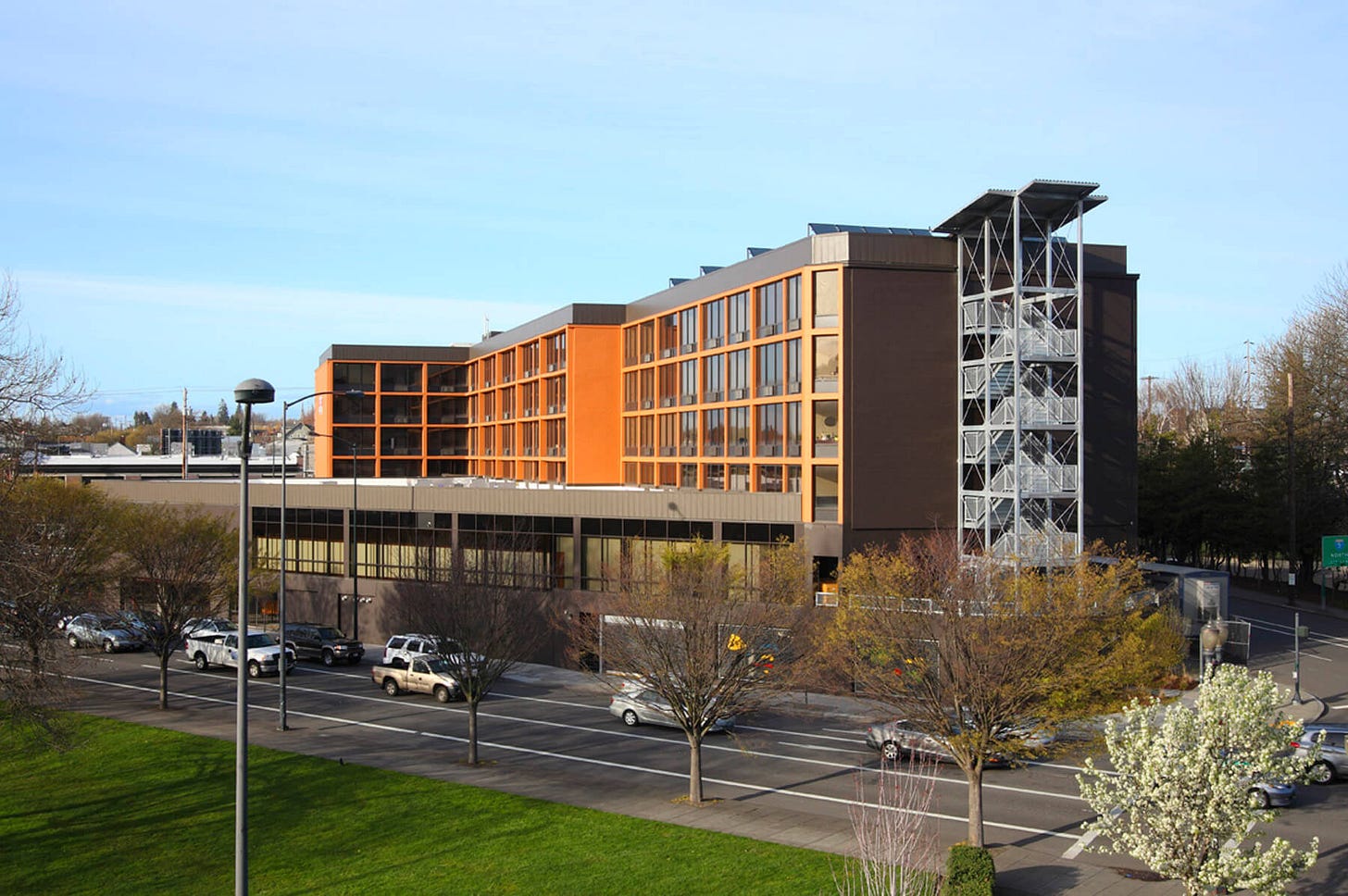This is why I call it the Homeless Industrial Complex
Why people love Housing First and hate all those that oppose it.
I have worked in homelessness services over two decades and it has never been easy. Verbal assaults are commonplace and even physical assaults have been known to happen. So is property damage, threats, accusations, backstabbing and getting doxxed. Reading this would make most people considering entering this field to change their minds. The homeless population are indeed a complex group of people and no two days are the same. Mental illness and addiction is prevalent as is childhood trauma that has effected about 90% of every homeless person I have ever met. I’m not talking about the homeless though. I am talking about the ones that work professionally in the field.
I started in the 1990s and things were different then. There were still differences of opinions but we always found a way to work together. Politics were rarely discussed and were irrelevant to the job we had. Homelessness was manageable too. It was not in every park or sidewalk, It existed in concentrated areas and the homeless services system, while not perfect we at least made a genuine effort to help.
Over the years though the homeless issue was clearly not getting solved and the voters were growing inpatient. We were seeing more and more people camping on the sidewalks. People started to speak up and demand results. I was personally growing frustrated watching year after year seeing the same homeless clients over and over again enter the shelters I worked for. It felt like we were nothing more than a revolving door. People were upset and the the Homeless services system was at risk of imploding if they didn’t do something. This was a real opportunity to regroup, listen to other points of views and then come up with a plan that would produce measurable results. I participated in some of those early meetings, but after speaking up on the importance of metrics and measurable results, I was not invited back. A few months later a majority of the leaders in a very coordinated effort did not come up with a plan to end homelessness, but instead changed the messaging of why they were unable to. Homelessness they declared had less to do with mental illness, chemical dependency, poor choices, etc. The real culprit was capitalism. Capitalism is what sent people to the streets and made them addicts. Capitalism is why there was crime. Capitalism was the reason for everything bad in the world.
It became the one word answer when people asked “How did this happen? It was very effective. Not only did it take away their responsibility they blamed it on something that had very little to do with the problem. The plan worked and many embraced it. A non-profit I was working for at the time forced a seminar on every employee on the evils of capitalism and then finished by suggesting who we should vote for(always liberal) This was happening at all agencies over and over again. It was very coordinated and within a year the brainwashing was complete. It was also made very clear from that point on to never disagree, have another point of view and to never express a concern.
Soon activists told me homelessness would not end until there were ‘no more rich people”. The homeless too became a protected class that were victims of a capitalistic society. They were thus no longer responsible for any and all bad behaviors. Responsibility was taken away as was our effort to empower them. We eventually enabled to the point of dependency and dependency is profitable.
People though were still demanding results and so when they asked “What can be done?” They came up with Housing First. What is Housing first? It is more of a philosophy than a model. It values flexibility, client choice and autonomy. Supportive services are a part of this model, such as addiction services or mental health treatment. However these supportive services are not required. “People have the agency to select the supportive services they need and want” This is also know as ‘Voluntary personalized services’. Translation: A homeless person would be placed in permanent housing and not expected to work on anything that either led them to the streets or kept them on the streets. The idea being, you place a person in low barrier housing for free their basic needs would be met and hopefully over time they would accept services. The reason why it was decided to make it voluntary is because all homeless people according to them are victims of capitalism and would not be fair to have any expectations of them. Hundreds of millions were spent on these buildings and you did see a noticeable difference. There were less people on the sidewalks. The public embraced Housing First, calling it a huge success.
This was not enough though. We were only spending millions and the system wanted billions. So after months/years of intensive lobbying, in 2013 President Barack Obama inaugurated the Housing First model as a one size fits all solution to homelessness. Despite no evidence it would work the administration promised it would end homelessness by 2023.
This was a massive windfall. Billions upon billions now committed towards a a very flawed model. Flawed because while there was a noticeable difference by seeing less people on the sidewalks we were in fact not solving the problem, but hiding it. Once the homeless move in they are left on their own. Staff are not allowed to approach them and offer help as it violates their philosophy. Offering help they say “creates a power dynamic that further reinforces a system of oppression”. This means nobody who doesn’t want help wont get it and to the ones that do but don’t know how to ask they too wont get it. I worked in a Housing First hotel and it was complete chaos. Massive drug use, fights, assaults, despair and death. Sometimes while on break I would stare up at the new beautiful building and think “people have no idea what is really going on inside”
Quickly these buildings were filled up and then requests were made for more. Most Housing First programs are for life, making budgets guaranteed to increase yearly forever.
A few of us though started to speak up. We did not agree with not only the waste but of our spectacular failure of the ones we were suppose to be helping. This did not sit well with the ones in charge. We were attempting to disrupt a billion dollar industry. This is when the bullying started. We were getting stalked, threatened and harassed daily. Activists would repeatedly smash our windows and other property damage. One such case happened while Pulitzer prize winning photographer John Moore was with Andrea Suarez of We Heart Seattle and I in Seattle. We were participating in a trash pick up. The activists were everywhere and one had just threatened me and my family. We turned our back and our van window got smashed. John took a quick photo immortalizing that moment.
On day one of my last job working in homeless services my mayor asked me
“So Kevin, whats your plan?”
He was asking me how I was going to help our cities homeless. I could have gone into a lengthy detailed explanation on the, model, approach, the partnerships, etc. I instead just cut to the chase.
“What’s my plan?… To work myself out of a job”.
This has always been my belief. We can and will end homelessness. The only thing stopping us is the ones in charge that are refusing to try a different approach. There has been a shift though and once again people are questioning everything. The question has never been if we can end homelessness, it has always been when. The when depends on us. Ten years ago President Obama said homelessness would end in 2023 under the Housing First model. That’s today. Lets all walk outside and view the success. If we ca agree it isn’t one lets work together, try a different approach and make it one.











"A few months later a majority of the leaders in a very coordinated effort did not come up with a plan to end homelessness, but instead changed the messaging of why they were unable to. Homelessness they declared had less to do with mental illness, chemical dependency, poor choices, etc. The real culprit was capitalism. Capitalism is what sent people to the streets and made them addicts. Capitalism is why there was crime. Capitalism was the reason for everything bad in the world."
That explains a lot about the small but very vocal group of well-connected homeless activists who are often in the periphery of news stories about homeless politics and policy but are almost never the main subject of the reporting. For that reason and others, the public knows next to nothing about homeless activists' politics. We're left to figure out their politics indirectly, for example, by their responses to local government's initiatives to regulate the homeless in order to make life better for them and to aid Portland's businesses, workers, residents and visitors who have been harmed by uncontrolled homelessness.
Three things are clear from activists' comments at public hearings, in the news and on social media. The first is that most of the vocal homeless activists have an animosity toward business bordering on outright hatred. They do not believe business has a legitimate place in politics, especially when it comes to formulating homeless policy or seeking government assistance in dealing with the negative impact of homelessness on customers and revenues.
Secondly, some homeless activists who defend encampments in affluent areas such as Laurelhurst routinely dismiss neighborhood residents' legitimate objections to encampments by calling them "rich," the message being that they are unworthy of having their grievances heard and responded to.
The tactic is an attempt to undermine homeowners' credibility, shame them into silence and paint them as class enemies. It's a perplexing move. For one thing, it's likely that many of the residents of Laurelhurst who are or were being harmed by the campers in the park bought their homes before the sharp price increases of recent years put the neighborhood out of reach for all but the affluent. The current value of their home may make them look rich, but when their income and other assets are taken into consideration they are decidedly not. Also, it's unlikely that the general public would be responsive to activists' efforts to stoke class resentment. Unlike activists, most grownups don't consider home ownership, even in Laurelhurst, a sign that a person is a member of the idle rich. Efforts to discredit homeowners because they're allegedly affluent are more likely intended for other members of the activist community as a way of reinforcing the righteousness of their cause.
Finally, news coverage of City Hall shows that homeless activists almost always object to any measure that the city commissioners propose as a way of aiding the houseless and reducing the negative impact of encampments on the city, its residents and its businesses. They reject all criticism of campers' behavior, painting them as traumatized victims.
The three characteristics are consistent with a far-left agenda that blames all of society's woes on capitalism. Unfortunately, recently Trump, MAGA and leading Republicans have decided to accuse progressive Democrats of being "communists" or "socialists" despite having no facts to support the claims. While the charges are no more true than any of Trump's thousands of other lies, the redbaiting on the right makes it difficult for centrists, especially Democrats, to confront the actual extremists on the left for fear of being discredited.
For that reason, it would be great to have more specifics about the Homeless-Industrial Complex's embrace of an anti-capitalist ideology. That would include giving the who, what, when, where, why and how of the turn towards the far left among activists working in the homeless sector. Until then, this outburst by the notorious activist Demetria Hester at a recent City Council hearing will be the closest thing we have to a statement of activists' politics in their own words:
“July 1st, when this comes in effect, be ready for what you have to deal with — us in 2020, us in the streets. Be ready, be ready. We’re coming for your jobs, your houses, your cars. What are you going to do then? Decide, because we’re coming for you Ted Wheeler. Fuck you."
https://portlanddissent.substack.com/p/fighting-the-homeless-ghetto?utm_campaign=reaction&utm_medium=email&utm_source=substack&utm_content=post
So I think there are some studies
cited as the basis for Housing First vs Treatment First… but this is from 2020…
https://www.ncbi.nlm.nih.gov/pmc/articles/PMC7427255/